|
 Cortinarius epiphaeus Cortinarius epiphaeus
SynonymsThaxterogaster epiphaeus
BiostatusPresent in region - Indigenous. Endemic
Images (click to enlarge)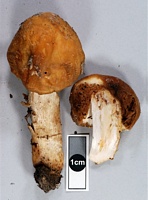
Owner: J.A. Cooper | 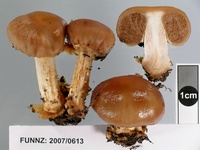
Caption: FUNNZ2007/0613
Owner: FUNNZ | 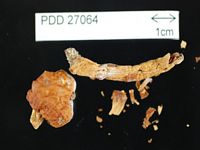
Caption: Dried type specimen
Owner: Herb PDD | 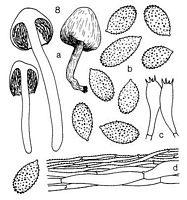
Caption: Thaxterogaster epiphaeum Hk. sp.n. (type): a. fruitingbodies.
b. spores. c. basidia. d. cuticle. | 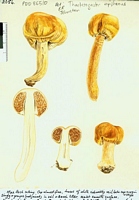
Caption: Watercolour
Owner: G.M. Taylor | 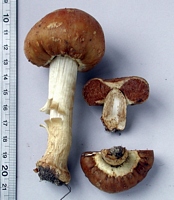
Caption: fruitbody
Owner: J.A. Cooper | 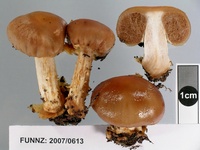
Owner: J.A. Cooper |
Article: Horak, E. (1973). Fungi Agaricini Novazelandiae I-V. Beihefte zur Nova Hedwigia 43: 200 p.
Description: Gastrocarp
15-30 x 15-12 mm, depressed globose becoming ovoid, peridium brown or yellow-brown
(pallid tan), slightly viscid, smooth, margin of peridium dehiscent from stipe
partially exposing gleba. Gleba loculate or indistinctly lamelliform, ± radially
arranged, loculi oblong, dull rust brown, with pallid tramal plates, gleba free
from stipe (columella) for about half of its length, exposed, but covered with
white thin veil. Stipe 40-80 x 5-10 mm, cylindric, occasionally attenuated towards
the base, whitish to yellow-brown, smooth, dry, hollow, without veil remnants.
Context white, longitudinally fibrous. Odor and taste not distinctive. Chemical
reactions on peridium unknown.
Spores 9.5-14 x 6-7 µm, elliptic, with minute warts becoming
coarser towards the apex, mostly axially symmetric, ferruginous. Basidia 30-37
x 8-10 µm, 4-spored. Cystidia absent. Epicutis consisting of radially arranged,
gelatinised, cylindrical (2-6 µm diam.) hyphae forming a cutis, membrane thin-walled
and encrusted with brown pigment. Hyphae of subcutis 5-20 µm diam. Clamp connections
numerous.
Habitat: On
ground under Nothofagus cliffortioides, N. fusca and N. menziesii. New Zealand.
Notes: This
species is well characterised by its yellow-brown colouration, the equal stipe
and relatively small, minutely warted spores. Only considering the species of
Thaxterogaster found in New Zealand, this taxa keys out to Th. carneolum
HK;. whose spores, however, are larger and the colours of the gastrocarp more
reddish brown. The closest relative is Th. cunninghamii Hk (see above)
which grows in the Eucalyptus forests of South Australia.
|